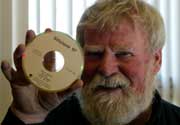
Communications Studies
Professor W. Lambert Gardiner.
Photo by Andrew
Dobrowolskyj
|
by Mark Rieger
One of the hallmarks of the information age is the sheer amount of information
available to us. Unfortunately, because there’s so much of it, it’s
often impossible to take it all in, let alone remember what we’ve
already read, seen and thought.
While many people keep diaries to help them remember the events of theiir
daily lives, Communications Studies Professor W. Lambert (Scot) Gardiner
has taken the idea of recording his thoughts for posterity a few steps
further.
His creation is called Siliclone, and when fully operational, it will
be a kind of virtual version of its creator, a computerized storehouse
of Gardiner’s thoughts and ideas.
“Siliclone is an attempt to integrate all of my information in one
place, so I can see it whole,” he said of his ongoing project.
Although Siliclone is still being developed, Gardiner has already made
extensive use of its storage capabilities. Drawing a distinction between
information, which he called content, and its meaning, or context, Gardiner
said that he and Siliclone each perform an important task.
“There is no need for me to memorize stuff,” he said, noting
that the CD-ROMs which currently house the project are much better suited
to that task. “Siliclone can memorize stuff — it loves lists.
My function is to put content into context.”
Gardiner said he had so far stored in Siliclone two books, four chapters
of books, four articles, five reviews and seven talks. He hopes that by
the time he dies, Siliclone will allow students and other interested people
to continue to access his thought. “Essentially, when I’m out
of here, I’ll leave my mind here,” he said.
Gardiner is the author of A History of Media, published earlier
this year. He has taught in Concordia’s Communications Department
since 1985, although his teaching career at the university began 20 years
earlier when Gardiner started teaching psychology at what was then Sir
George Williams University.
“After five years of that the lectures evolved into a book, and the
book made me obsolete,” Gardiner remarked.
He realized that once he had developed his course to the point of being
able to write a book based on his lectures, he had gone as far as he could
with the subject.
Rather than remain in the psychology department, Gardiner travelled, exploring
the burgeoning American counterculture while thinking and writing about
new ideas of teaching and learning.
“I wrote a book called The Psychology of Teaching, which argued
for turning teaching inside out,” he said. After further reflection,
he came to believe that the way to effect such change would be to turn
teaching from what he called an “outside-in” process to an “inside-out”
one.
Traditionally, Gardiner argued, teaching has been regarded as a process
in which a person with knowledge, the teacher, gives that knowledge to
people without it, the students.
His new educational concept, he said, was based on the idea that after
centuries of evolution, human beings are already in possession of the
collected wisdom of the species.
Teaching, according to Gardiner, should focus more on developing that
wisdom in students, and allowing them to realize their potential abilities.
“Essentially, teaching is passing along the operating manual [of
the species]. It helps people unwrap the conception-day gift,” he
said.
Siliclone, which has a Web site siliclone.com, plays a role in
Gardiner’s new teaching idea. When it ultimately makes Gardiner’s
virtual mind available, he said, he hoped it would allow his students
to choose which aspects of his thought they wished to study.
“They access it and explore it,” he said. “It’s much
more useful [than traditional teaching].” However, it will still
be some time, Gardiner acknowledged, before Siliclone is a fully operational,
interactive resource.
“At the moment, it’s pretty primitive. There is the need for
a good search engine, so you can put together pieces of my mind based
on your interests,” he said.
Still, the process of recording his thoughts and memories has been very
rewarding, Gardiner said. His only regret is that he didn’t start
collecting information about himself sooner.
“I find it a very rich process,” he said. “It makes you
conscious of your consciousness.”
You can access Siliclone at http://www.siliclone.com.
|
|
|



